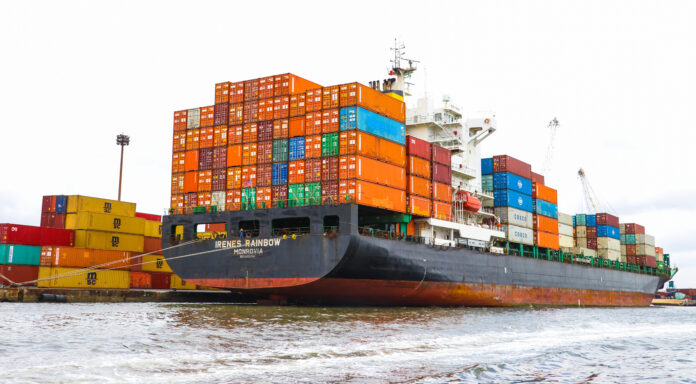The death of a dockworker at Tin-Can Island Port in Lagos has ignited outrage among maritime workers, who have decried the glaring safety lapses at the Five Star Logistics Terminal. The Maritime Workers Union of Nigeria (MWUN) has warned that unless immediate action is taken, more fatalities could occur.
The Christmas Day tragedy involved a Liebherr Crane onboard the vessel MSC Samu, which crushed a dockworker, leaving the port community in shock. Union leaders have described the incident as the tragic result of negligence by the terminal operator and its stevedoring contractor.
“Death Traps Everywhere”
Speaking on the situation, MWUN President-General Comrade Adewale Adeyanju condemned the unsafe conditions at the terminal. During a condolence visit to the site, Adeyanju painted a grim picture of the working environment.
“What I saw was disheartening,” Adeyanju stated. “There are several death traps inside Five Star Logistics Terminal, and I wouldn’t be surprised if more workers are injured or killed while working.”
He criticized the terminal operator for failing to enforce basic safety standards, noting that workers were seen wearing bathroom slippers instead of safety boots. Many lacked helmets or protective overalls, essential in high-risk port operations.
“This is unacceptable,” Adeyanju declared. “Stevedoring is not factory work; it is a global profession with standards. In other countries, workers are well cared for, but here, it’s a different story.”
Supervisory Lapses
Adeyanju pointed to a critical lack of oversight as a key factor in the Christmas Day incident. He revealed that only one supervisor was present to oversee nearly 60 workers during the vessel’s operation, a situation he described as “pure negligence.”
“You cannot have a single supervisor monitoring the front, middle, and back of such a large vessel. Is he a robot?” Adeyanju asked rhetorically.
He added that two supervisors assigned to manage the Liebherr Crane were reportedly absent during the incident.
“This is terrible. A vessel of this size should have at least three supervisors—two onboard and one onshore. How can one person manage close to 40 workers effectively?” he questioned.
A Systemic Problem
The MWUN President-General criticized the broader disregard for worker welfare by many terminal operators, describing it as a systemic issue in Nigeria’s maritime industry.
“Most terminal operators do not prioritize workers’ welfare. Only a few understand the importance of safety,” he said. “We are talking about human lives here. A responsible company would have provided a clear explanation of what happened.”
Adeyanju vowed that the union would not remain silent on the issue. He announced plans to file a formal report against the stevedoring contractor responsible for the operation on the day of the tragedy.
A Call for Action
The union leader’s statements highlight long-standing concerns about safety and labor practices at Nigerian ports. The death of the dockworker is not an isolated incident, with unions repeatedly raising alarms about inadequate safety measures and exploitative practices.
Industry insiders have noted that many terminal operators cut corners to maximize profits, often at the expense of worker safety. The lack of enforcement of safety regulations and the absence of accountability mechanisms have created a dangerous environment for dockworkers.
Adeyanju’s comments also shed light on the inequality between global and local port operations. “In other countries, safety is paramount,” he said. “Workers are equipped with proper gear and are given the support they need to work efficiently and safely. Why should Nigeria be different?”
Demand for Accountability
The MWUN has called for an independent investigation into the incident and has demanded that terminal operators implement stricter safety protocols. Adeyanju stressed that the union would hold negligent parties accountable.
“This is not just about one dockworker; it’s about the safety of every maritime worker in this country,” he said.
Adeyanju further urged government regulators to take a more active role in ensuring compliance with safety standards at Nigerian ports.
A History of Neglect
The tragedy at Tin-Can Island Port is a reminder of the risks faced by Nigerian dockworkers. Similar incidents have occurred in the past, with little to no significant reforms implemented to address safety concerns.
The port, one of Nigeria’s busiest, plays a crucial role in the nation’s economy. However, the lack of adequate investment in worker safety threatens to undermine its operations and reputation.
Maritime workers have repeatedly called for improved training, better equipment, and increased oversight to prevent further tragedies. Yet, these appeals have often fallen on deaf ears.
The Way Forward
Industry experts argue that a comprehensive overhaul of Nigeria’s maritime labor practices is long overdue. They recommend mandatory safety training for all port workers, stricter enforcement of safety regulations, and regular audits of terminal operations.
Adeyanju emphasized that the MWUN would continue to advocate for workers’ rights and safety. “We cannot stand by and watch as workers’ lives are put at risk due to negligence and greed,” he said.

